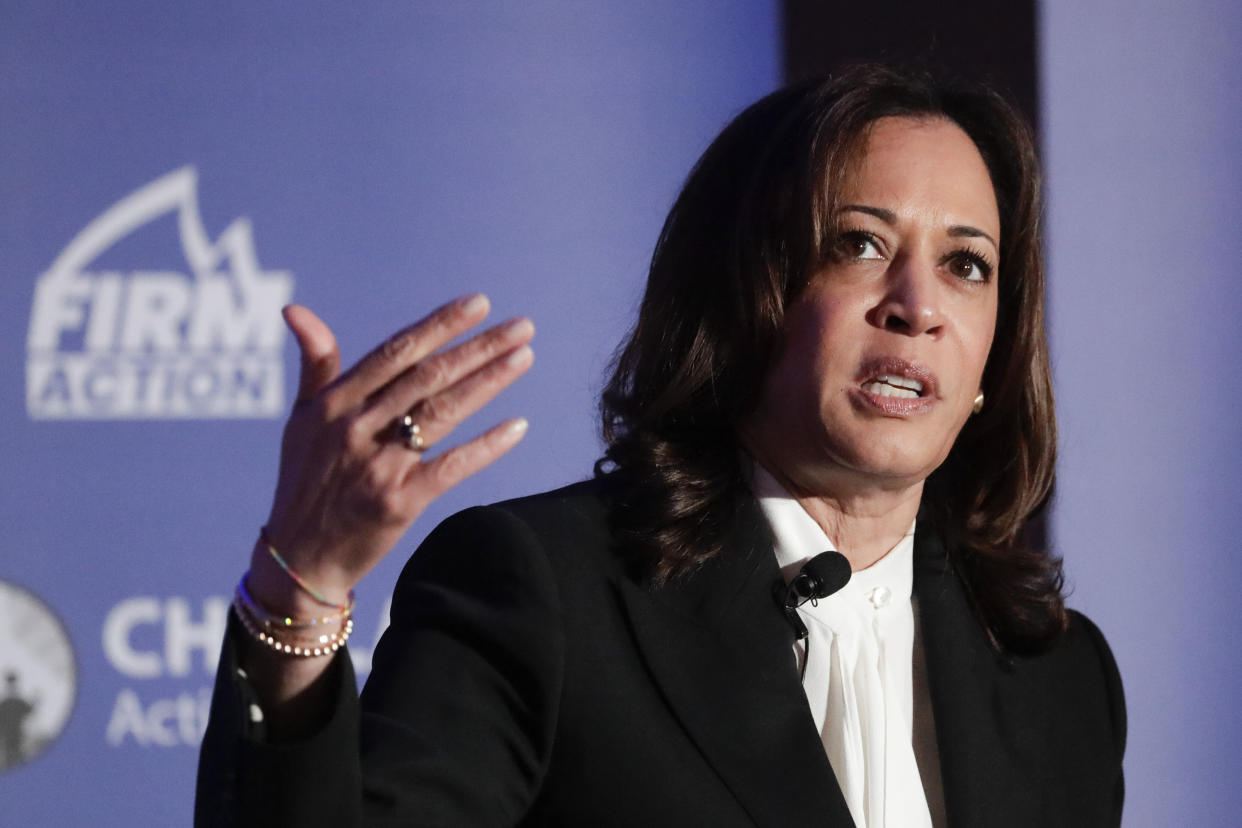Harris, Sanders and rivals put immigration reform on 'first 100 days' list

PASADENA, Calif. — Democratic presidential candidate Sen. Kamala Harris decried President Trump’s “backwards, hate-driven” immigration policies and pledged Friday to push in the first 100 days of her administration for comprehensive immigration reform with a pathway to citizenship for undocumented immigrants.
“Absolutely yes,” the California senator said when asked whether she’d make such a commitment during the Unity and Freedom Presidential Forum, the first gathering of 2020 White House hopefuls focused on immigration. “Every day in America until we resolve this issue there are real consequences for real human beings. That’s why the first 100 days are important to me.”
Harris’s promise was echoed by the other candidates at the event — Vermont Sen. Bernie Sanders, former Housing and Urban Development Secretary Julián Castro and Washington Gov. Jay Inslee — all of whom had traveled to California, along with at least 10 other Democratic candidates, to court potential supporters at this weekend’s state Democratic Party convention in advance of next March’s delegate-rich presidential primary.
Yet recent history suggests their pledge may be difficult to keep — and politically risky.
In 2008, then candidate Barack Obama made a similar vow to push for comprehensive immigration reform during the first year of his presidency. But immigration ultimately took a back seat to the financial crash and the Affordable Care Act, and by the time Obama circled back he no longer had the 60 Senate seats or political capital necessary to pass reform. Activists were critical of his failure for much of his two terms.
“The lesson we should take [from Obama’s experience] is ‘Don’t wait,’” Castro said onstage. “So I won’t.”
The willingness of Harris and her rivals to put immigration front and center reflects the key role Latinos could play in the 2020 election.
Next year they will surpass African-Americans to become America’s largest bloc of eligible minority voters, according to a recent Pew Research Center study. The two states with America’s largest Latino populations, California and Texas, will vote in the Democratic primary on Super Tuesday, March 3 — much earlier than usual. And Democrats’ top two fall Senate targets, Arizona and Colorado, also have huge Latino electorates.
It all adds up to a ton of potential influence, both in the primary and the general election. Whether Democrats capitalize on that remains to be seen. In the 2018 midterms, Latino turnout spiked 50 percent overall, the largest increase of any racial or ethnic group. Driven by antipathy to Trump and his agenda, Latino voters were “largely responsible” for Democratic Senate wins in Nevada and Arizona, according to a recent analysis by pollster Latino Decisions and Democratic data firm Catalist.

Yet in Florida, Republican candidates for Senate (Rick Scott) and governor (Ron DeSantis) actually performed better among Latinos in 2018 than their 2014 Republican counterparts, slashing the Democratic advantage in half from 20 percentage points to 10. Why? Because Scott and DeSantis outcampaigned Democrats in Latino precincts and benefited from preexisting GOP infrastructure in the community. And both of them wound up winning that November.
It’s a cautionary tale for Dems. Latinos vote Democratic — but they don’t vote Democratic at the same rates as African-Americans or Asian-Americans. Immigration isn’t the only issue that matters to Latino voters; it isn’t even the top issue, according to polls. Without extensive outreach and organization by the 2020 nominee, it’s no guarantee that they will show up at the polls or support Democrats in the numbers required to ensure victory in key states and races.
In that regard, Castro insisted that even 100-day pledges aren’t enough. “We have to be fearless,” said the former San Antonio mayor — the only Latino candidate in the race, and one of only three, along with Inslee and former Texas Rep. Beto O’Rourke, who have released a detailed immigration plan. “This president thinks he’s going to win 2020 on the backs of our immigrants. And I’m determined to make sure that he loses.
“It’s not enough to complain about a couple of things the administration is doing,” Castro added in a veiled shot at candidates such as Harris and Sanders who have been less specific about their immigration policies. “We have to give the American people a plan for how we’re going to fix it.”
_____
Read more from Yahoo News:
In quest for Gen Z votes, 2020 could be the year of the influencer
How Trump’s embrace of a rogue Libyan warlord sparked a humanitarian catastrophe




